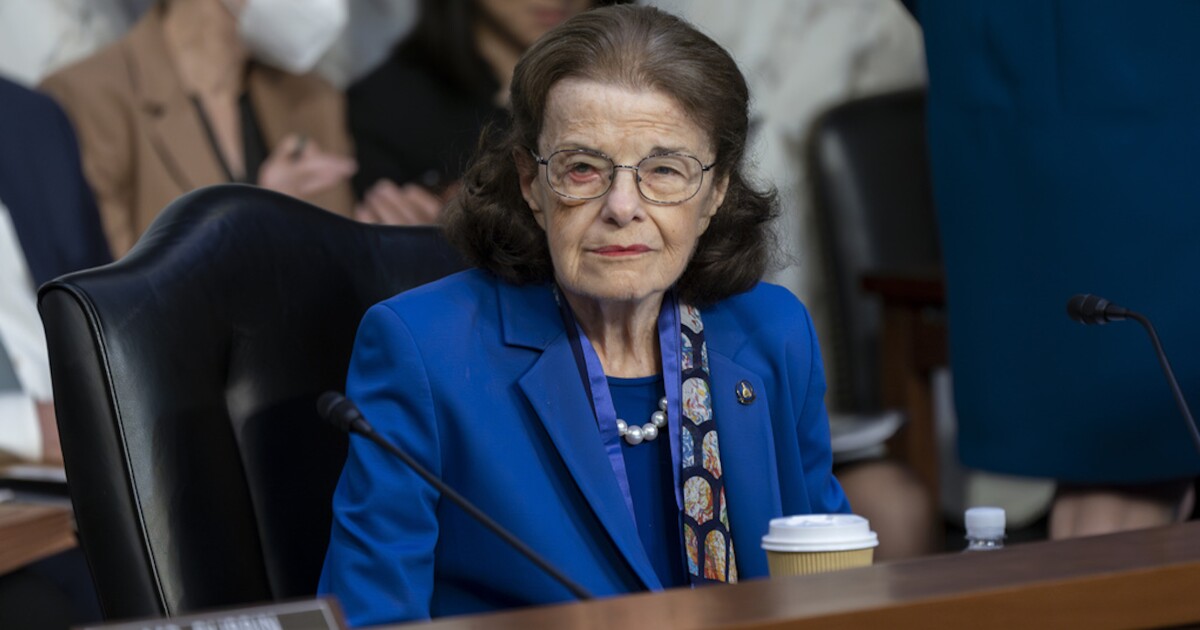

Concerns about Sen. Dianne Feinstein’s (D-CA) age and overall health have intensified in the eight days since her highly anticipated return to the Capitol.
Feinstein, the Senate’s oldest member at 89, returned to the chamber last Wednesday amid enormous pressure from inside her party to come back or resign. Her absence from the Senate, which began in February following a shingles diagnosis, stymied Democrats’ ability to pass President Joe Biden’s nominees and legislative efforts. The party only controls the Senate by a 51-49 margin, meaning that one absence gives Republicans an opportunity to block any partisan effort.
TIM SCOTT PICKS UP FIRST SENATE ENDORSEMENT AHEAD OF WHITE HOUSE ANNOUNCEMENT
After years of criticisms from those in her party that she was no longer up to the job, Feinstein said at the time of her diagnosis that she wouldn’t seek reelection in 2024, though she vowed to serve out the remaining 20 months of her term. Facing resignation calls from House Democrats and frustration from her Senate colleagues that was spilling out into public view, a wheelchair-bound Feinstein returned to the U.S. Capitol last week looking frail and at times disoriented.
The 89-year-old has largely been kept out of public view since then, being whisked to and from votes and committee hearings by staff without taking many questions from journalists.
“I can’t right now,” Feinstein said Thursday morning while responding to shouted questions from the Washington Examiner and others about her condition and fitness to serve. She was being wheeled into a Senate Judiciary Committee hearing when she made the quick comment, her second such event since returning to Washington.
Feinstein received a standing ovation from her colleagues on both sides of the aisle at her first Judiciary hearing since her return last Thursday, a moment she appeared confused by when asked about it on Tuesday.
“I haven’t been gone,” the California senator said after a reporter asked about the well wishes she’d received from Senate colleagues since returning last week. “I haven’t been gone. I’ve been working.”
Pressed on if she meant she had been working from home, Feinstein replied, “No, I’ve been here. I’ve been voting. Please, either know or don’t know.”
That incident came just two days before a series of bombshell reports about the veteran Democratic lawmaker. The first, published Thursday morning, revealed that Nancy Corinne Prowda, the daughter of former House Speaker Nancy Pelosi (D-CA), is quietly working for Feinstein as she attempts to serve out the remainder of her term.
Prowda did not respond to the Washington Examiner’s questions about her work with Feinstein when walking the senator into the Judiciary hearing Thursday morning.
The second report, which came Thursday afternoon, revealed that Feinstein was suffering from complications caused by her shingles diagnosis that she had neglected to disclose to the public amid growing resignation calls.
The New York Times stated that Feinstein’s shingles had “spread to her face and neck, causing vision and balance impairments and facial paralysis known as Ramsay Hunt syndrome.” She was also experiencing post-shingles encephalitis, which “can leave patients with lasting memory or language problems, sleep disorders, bouts of confusion, mood disorders, headaches and difficulties walking.”
Asked about the undisclosed diagnoses after the report was published, Feinstein denied having encephalitis, saying it “really has never been diagnosed” and that she merely had a “really bad flu.”
As other outlets began to confirm the diagnosis rumors with sources close to Feinstein, her office acknowledged she was suffering the effects of Ramsay Hunt syndrome but did not address the encephalitis matter specifically.
The report alleged that while in California recovering after her February diagnosis, Feinstein declined to take Gov. Gavin Newsom’s (D-CA) phone calls and turned down Sen. Alex Padilla’s (D-CA) offers for an in-person visit. She did, however, stay in touch with Senate Majority Leader Chuck Schumer (D-NY), who encouraged her to listen to her doctor’s advice while stopping short of urging her to resign. When it became clear that resignation was not something she was considering, Schumer started preparing for her return.
Schumer refused to comment after the report on her health dropped.
Senate Majority Whip Dick Durbin (D-IL), who serves as chairman of the Judiciary Committee that Feinstein’s absence has paralyzed, told CNN on Wednesday he was “monitoring her medical condition almost on a daily basis.”
He said after the report on her health was released that he did not know about the additional diagnoses, but added, “You can tell that her right eye is affected by it. My mother went through something similar. It’s really a painful experience.”
Sen. Lindsey Graham (R-SC), the top Republican on the Judiciary Committee, told CNN on Wednesday of Feinstein, “As a friend, you can see she’s hurting.” He declined to comment on the latest news about her condition when asked about it by the Washington Examiner on Thursday afternoon.
Another Republican who serves on the Judiciary Committee, who requested anonymity to speak freely, told the Washington Examiner that they hadn’t seen or interacted with Feinstein enough to be able to assess her condition.
CLICK HERE TO READ MORE FROM THE WASHINGTON EXAMINER
“She’s been gone a lot,” the senator said.
Several Senate Democrats defended Feinstein when asked by the Washington Examiner on Thursday if she was fit to serve, though that was before the report on her condition came out. Others, such as Sen. Ben Cardin (D-MD), demurred, saying they had not seen Feinstein since her return.







